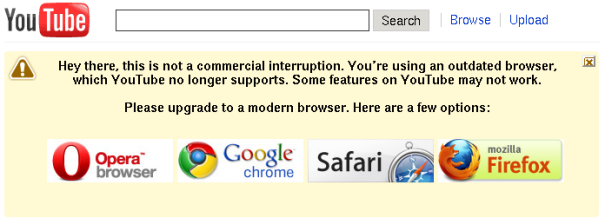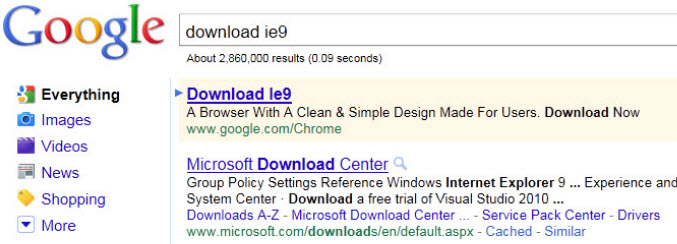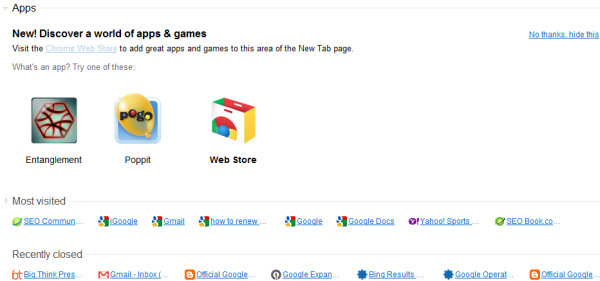Download IE9
If Microsoft used their primary product to bundle other free products they were giving away to gain market leverage Google would hoot and/or holler. Google demanded that Chrome be shown as an option in Europe when Microsoft was required to market their competitors via BrowserChoice.eu.
Yet if you visit YouTube with an old browser you can see that Google claims it isn't an advertisement, yet somehow Internet Explorer didn't make the short list.

IE9 launched as a solid product with great reviews and enhanced privacy features.
A new version of Microsoft Corp.'s Internet Explorer to be released Tuesday will be the first major Web browser to include a do-not-track tool that helps people keep their online habits from being monitored.
Microsoft's decision to include the tool in Internet Explorer 9 means Google Inc. and Apple Inc. are the only big providers of browsers that haven't yet declared their support for a do-no-track system in their products.
I have long been a fan of using multiple web browsers for different tasks. Perhaps the single best reason to use IE9 is that a large segment of your customer base will be using it. Check out how search is integrated into the browser and use it as a keyword research tool.
The second best reason to use it is that sending some usage data to Microsoft will allow them to improve their search relevancy to better compete with Google. As a publisher I don't care who wins in search, so much as I want the marketshare to be split more evenly, such that if Panda II comes through there is less risk to webmasters. Stable ecosystems allow aggressive investment in growth, whereas unstable ones retard it.
Speaking of Google, Michael Gray recently wrote: "They are the virtual drug dealers of the 21st century, selling ads wrapped around other people’s content, creating information polluted ghettos, and they will become the advertising equivalent of a drug lord poised to rule the web."
The problem with Google's ecosystem was not only that it was running fast and loose (hence the need for the content farm update, a problem Google created, and a solution which had major collateral damage along with some unintended consequences, while missing the folks who were public enemy #1).
Beyond that, Google recently announced the ability for you to report counterfeit products advertised in AdWords. Their profit margins are pretty fat. Why did the problem go ignored so long? Why does the solution require you to work for Google for free?
In the following video, Matt winces, as though he might have an issue with what he is saying. "We take our advertising business very seriously as well. Both our commitment to delivering the best possible audience for advertisers, and to only show ads that you really want to see." - Matt Cutts
How does this relate to Internet Explorer 9? Well let's look at what sort of ads Google is running:


I am not sure if that is legal. But even if it is, it is low brow & sleazier than Google tries to portray their brand as being.
If Microsoft did the same thing you know Google would cry. Ultimately I think Google's downfall will be them giving Microsoft carte blanche to duplicate their efforts. Microsoft has deep pockets, fat margins, and is rapidly buying search marketshare. If Microsoft can use their browser as a storefront (like Google does) they have much greater marketshare than Chrome has.

Cory Doctorow's excellent essay "Beware the spyware model of technology – its flaws are built in" is a great read & warns where the above approach leads.





Comments
Everything is fair in search and browser wars.
I love that Apple and Google are the only browsers that won't stop monitoring personal click habit information. Arguing it as a necessity to improve performance is going to be an interesting marketing spin to observe when the public demand continues going the other way. an-ti-TRUST! an-ti-TRUST! I am conjuring pitchforks and torches...
That's what everyone says anyway. So of course it should be shouted from all roofs, by every means possible.
I say we go with Opera. It's a good browser, yet everyone looks at me like I'm an alien when they hear I'm using it. Like Firefox and Chrome are the only worthy browsers in this world. Lastly all I hear is Chrome, Chrome, Chrome. For the life of me I can't understand why internet marketers and particularly SEOs are doing SEO related work (other than testing) with Google's browser. I'm not too well informed in these matters, maybe the browser is not passing very much information to "the enemy"? Still, I'd rather be paranoid than trendy. On the other hand, Opera singles me out, might be good to go with IE9 when I don't want to leave traces in people's traffic statistics...
Another good post Aaron. I have been using IE9 for the past few months and it is pretty fast.
at an earlier time in the same video when he said "is this page from a quality website or low quality -- even spammy?"
So the micro-facial expressions indicate that ads are often seen roughly as an equivalent to spam.
Great post Aaron - it's always a pleasure to read your articles that bring important points like this into the eyes of the public. Google has far to much power and control way to much in the flow of information - as displayed by your example with Google putting an ad for ie9.
I've just learned today that Facebook is going to be using your photos in advertisements on your friends pages, and it sure wasn't Mark Zuckerberg that told me.
Google has stepped on so many toes, and yet they seem to have no plans of stopping. Let's hope the EU and others put enough pressure on Google to rethink a few of their methods.
Thanks for the read!
Kris S.
Nice post.
One thing to add,bidding on a brand name (not yours) is legal,but you can not use it anywhere in your ad copy.
Google's long advertised on Microsoft's IE terms. It goes back to at least 2007 and IE 7. http://cityseo.blogspot.com/2007/09/google-stealing-internet-explorer-7....
That is pretty bad!
I'm not a Microsoft fan but I have to admit they've done a decent job with IE 9. It's still not up to supporting as many of the newer technologies as other modern browsers but it's a great move forward and will make life easier for all of us who create websites.
However, regardless of the other Google practices you've outlined, I can see good reason why Google wouldn't offer IE 9 as a suggested choice for upgrading an outdated browser. Most people using outdated browsers are also on old operating systems. IE 9 requires Windows 7 so it's not even a viable choice for most people hanging onto IE 6.
This is the same problem that makes Microsoft's recent efforts to apologize for IE 6 and move people off of it seem a little disingenuous. (http://ie6countdown.com/) The only option they offer is to upgrade IE even though the latest version won't work for all those people still running Windows XP, so they're left with IE 8.
We really don't want folks on IE 6 only upgrading to IE 8. That just serves to cement another non-standards-compliant browser in our way for many more years to come.
Hi Aaron
Well spotted.
Well i suppose if dynamic insertion is a feature of PPC then you should use it. Although in this case it clearly contravenes Google's own guidelines on using trademarked phrases in Ad titles!!
As to IE9 well i might just to have to give it a go. The recent Chrome flash bug issue has also shown that Google are not averse to releasing software that is not fully tested either.
Garry Davis
WhyCommunicate?
http://www.whycommunicate.co.uk
In the case of ads, I agree. In the case of the organics results, it is better that Google transfers the responsibility to neutral parties, just as they do with the DMCA form. Google should go even further and have neutral parties evaluate duplicate content in their Panda process. This will slow down their war against duplicate content, we will have more annoying duplicates, but it is worth it because it will prevent that the wrong entries get suppressed. It will also allow all entries to be visible for at the least some time, thus protecting our liberty of expression.
Besides, it is better to rely on the interaction between companies. Therefore, Google should encourage the use of the canonical tags across domains, even across companies. To achieve that, companies should be allowed to use the canonical tag on pages that target different users as long as these different users are likely to equally appreciate the common conceptual content. The "canonical" page that appears in the search results could then be selected in view of its targeting criteria and what is known about the current users from its query, its user preferences, etc. If the different targeted users are likely to equally appreciate the conceptual content and that the targeted differences only improve their experience this approach makes perfect sense. It will encourage companies to work together to consolidate the link juice, improve their customer experience, avoid duplication and each company will benefit from this.
How can we determine that different targeted groups are likely to equally appreciate a given content. In most cases, it seems impossible. Say if the groups have different geo locations, clearly they can have a different attitude toward the content, same thing for the language (i.e. the culture), etc. However, there is one case where it seems to work : the groups are targeted by companies that are true competitors - by definition they target the same people. Interestingly, this is the case that is the most problematic. It would still have to be done case by case, but it will be faster than to wait for the resolution of a court case. Now that I think about it, a similar approach is often used by scientific journals. When competing research groups submit a same result, instead of having them argue who did it first, etc. they ask them to write a join paper.
Add new comment